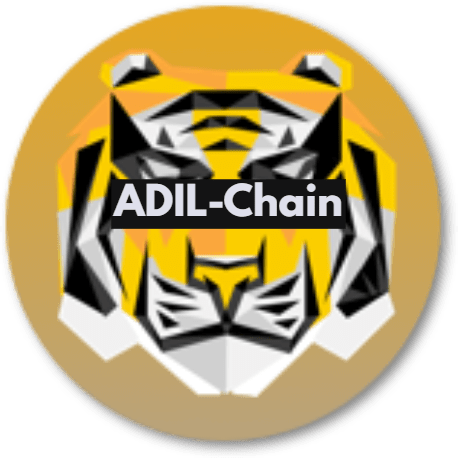Adil-Chain – your hybrid blockchain. Find out more about the project’s features and direct access to its official website.
ADIL-Chain stands as a decentralized Blockchain and the aim is to create a robust, fortified hybrid blockchain. This entails integrating an anti-fraud filtration system administered by designated authorities, akin to centralized governance practices.
Blockchain news is currently marked by the arrival in force of a very interesting protocol that meets a real need. Here are its characteristics.
Adil-Chain – introduction:
ADIL Chain is fueled by both technology and mission, striving to convey the foundational principles propelling us onward.
Blockchain heralds a profound shift in human-tech engagement.
We stand on the cusp of a transformative epoch in human-machine interaction. Traditional centralized tech giants have peaked in their transformative capacities, yet blockchain’s potential is only beginning to unfold.
Features:
ADIL Chain operates as a public, permissionless blockchain, seamlessly compatible with the Ethereum Virtual Machine (EVM), and operates on a global Proof-of-Stake consensus mechanism. This blockchain invites participants worldwide to contribute, ensuring the accurate verification and security of records.
Beyond merely recording transactions, ADIL Chain enables the execution of « smart contracts » – computer programs facilitating asset transfers with transparent and equitable logic. Engineered for compatibility with Ethereum, the foremost smart contract platform, ADIL Chain distinguishes itself in this introductory exploration by illuminating the necessity and functionality of blockchains.
Why Utilize Blockchain?
Interactions among various entities necessitate trust—a reliance on the commitments made by others. Trust, traditionally costly and volatile, plays a pivotal role in our societal dynamics.
However, contemporary technology offers an alternative approach. Trust no longer needs to stem solely from individuals or institutions; it can now be encoded and guaranteed through technology.
By harnessing public/private key pair cryptography and innovative incentivization and penalty mechanisms, new protocols empower individuals and entities to trust the integrity of records without depending on third-party oversight. This eradicates the human factor, characterized by ambiguous expectations and enforced through intricate legal agreements or mere facades of integrity. Operations become more efficient, reliable, predictable, and cost-effective for all involved parties.
Initial Traction
While the power of this new protocol is only beginning to be understood, blockchain has already found traction in the world. Imagine, a global and decentralized system without borders or intermediaries, where contracts are tamper-proof and completion guaranteed by code.
Exploring Further Applications
Blockchain fundamentally alters the traditional assumptions regarding ownership, reliability, collaboration, and trust. While the complete breadth of blockchain’s potential remains yet to be fully realized, its capacity to redefine and address numerous existing challenges is already evident:
- Anti-fraud Measures: The immutable and persistent nature of blockchain records facilitates swift and cost-effective auditing, offering a simple yet effective means to combat fraud.
- Crowdfunding: Blockchain has already facilitated the successful public and anonymous crowdfunding of various projects. The platform’s built-in payment processing capabilities and the potential for investors to receive tokenized assets serve as intrinsic advantages.
- Gaming Industry: Blockchain-powered games, spanning from casual mobile gaming to dice or card games, lotteries, and auctions, stand to benefit significantly from the transparent and cost-efficient nature of smart contracts.
- Governance: In both private and public organizations, blockchains can implement smart contracts serving as code-based constitutions, dictating actions and performance standards. These contracts directly gather votes from stakeholders and execute winning proposals, automating and verifying fund or asset disbursements without the need for trust. Public institutions can leverage the blockchain’s immutable records to enhance security, integrity, and transparency in the voting process. These immutable records are easily auditable and resistant to censorship.
- Ownership: Acquiring and managing assets, whether in the physical or digital realm, becomes simpler, more cost-effective, and trustworthy through blockchain-based solutions.
- Personal Data Ownership: Blockchain-based key-sharing techniques offer improved management of personal data such as internet browsing history and digital footprints. For instance, digital medical records can be securely stored on-chain, with access controlled by private keys. These records are resistant to tampering, ensuring security and efficiency, thereby enhancing physician workflow and patient care quality.
What does this mean?
While blockchain technology holds immense potential, developers have only begun to scratch the surface of its capabilities. There are opportunities to innovate in storing value, automating processes, and guaranteeing trust at a fraction of previous costs. However, there is still considerable work ahead to fully realize this potential.
Problem and Solution
As blockchain protocols first came into usage, there were a few significant problems. The first of which has been described as the blockchain trilemma.
It has been the common understanding that a blockchain could not achieve security, decentralization, and scalability all at once–that one of those three would have to be sacrificed in pursuit of the other two. Many blockchains have thus sacrificed scalability, settling for low throughput and slow confirmation speeds.
ADIL Chain believes that our consensus protocol is the best of the Proof-of-Stake protocols in that we have resolved the trilemma.
The Proof-of-Stake protocol–described in part II of this document–permits an open, permissionless network to achieve over 2,000 transactions per second and one-second confirmation time. As a public permissionless blockchain, our consensus mechanism allows any token holder to become a proposer or a voter and contribute to the security and decentralization of the chain.
